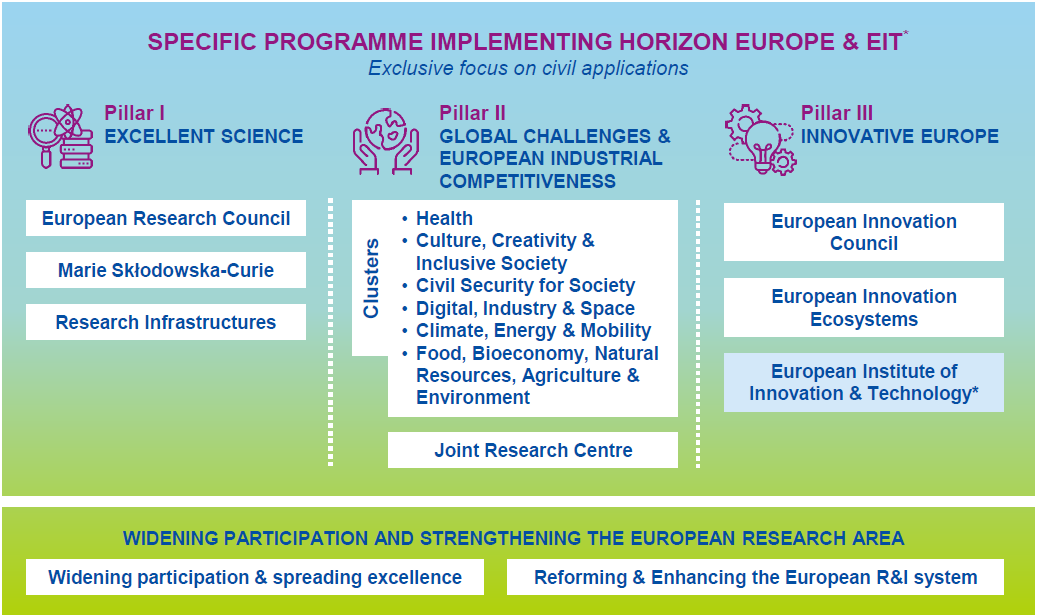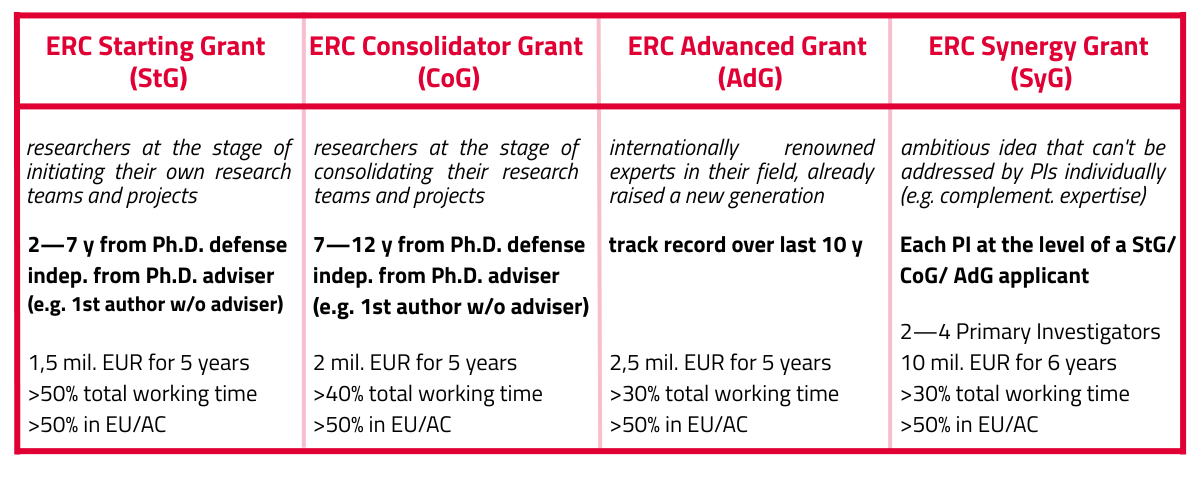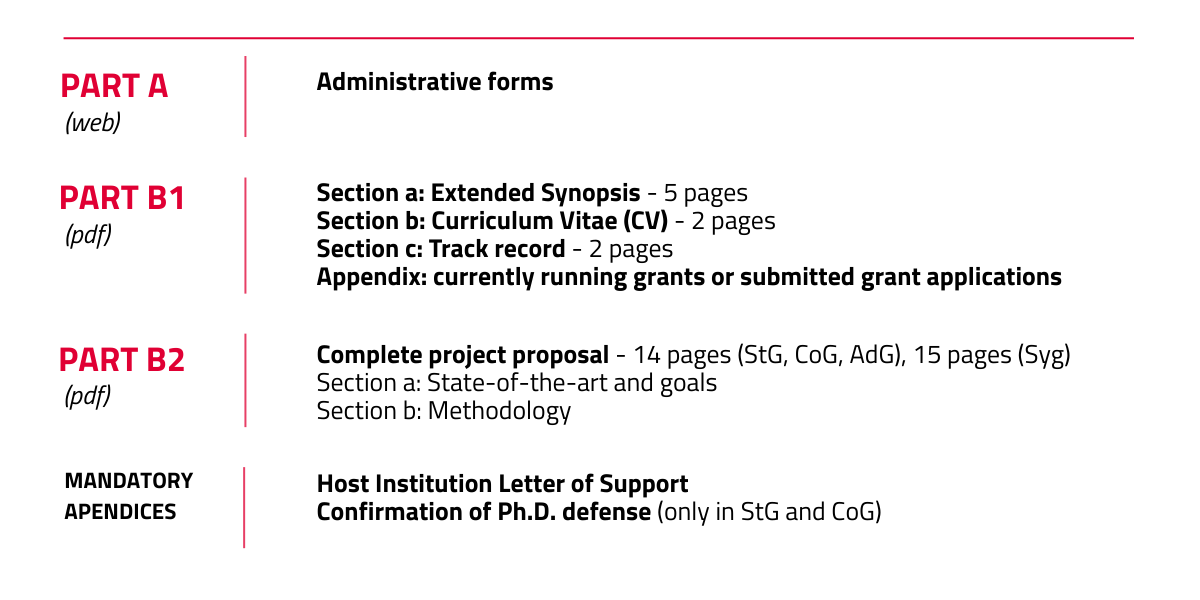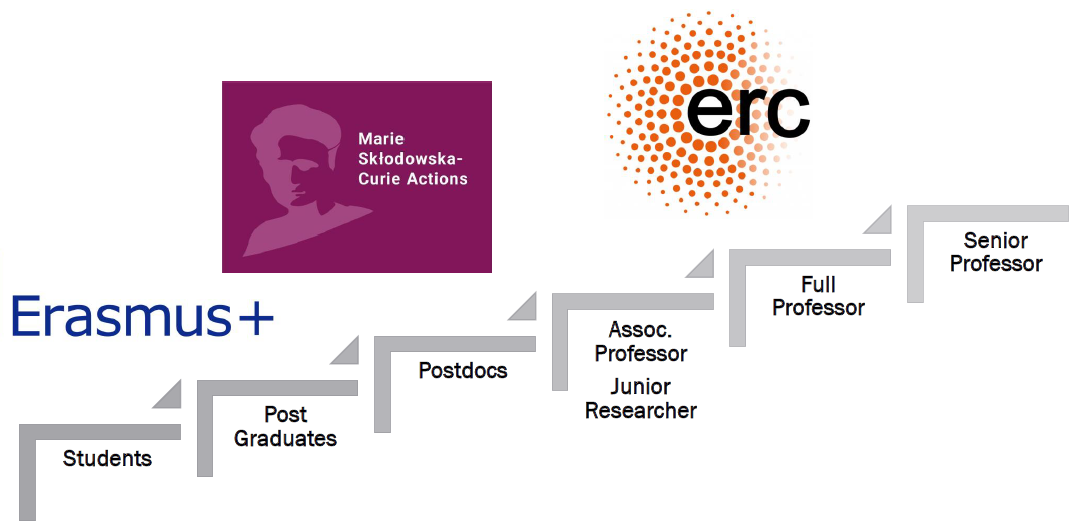EU Desk
HORIZON EUROPE

Horizon Europe (HE) is a robust framework programme dedicated to science and innovation throughout the years 2021 - 2027. It consists of three pillars that support excellent science, tackle global challenges, and promote innovation.
Technology Center Prague (TC) supports Czechia's participation in the European Research Area and thus in Horizon Europe. They prepare analytical and conceptual studies for research and innovation, facilitate international technology transfer, and support the creation and development of innovative companies. Last but not least, the Technology Center offers support and consultations to those applying for grants in the HE programme. You can learn more about their offer on the TC website.
In April 2025, USB launched a scheme to reward researchers applying for ERC grants. You can find more information in the ERC section below.
The ERC’s mission is to encourage the emergence and deployment of a new generation of Europe’s research leaders. Through five types of grants, the ERC funds so-called frontier research—ambitious, high-risk projects that move the boundaries of current knowledge and aim for groundbreaking discoveries across all scientific disciplines.
ERC grants fall under Pillar I of the Horizon Europe programme, which focuses on excellent science. As such, the ERC supports projects led by individual researchers—referred to as Principal Investigators (PIs)—and their teams. Grants are associated with PIs rather than with their institutions. However, a PI must be employed by or have a contractual relationship with a host institution.
Types of ERC grants
 Content source: Technology Center CAS
Content source: Technology Center CAS
Preparing an application
In an ideal scenario, the applicant starts to prepare a few years ahead of submitting an application. The only evaluation criterion of the ERC is research excellence - of the proposed project and of the PI. This means that any researcher interested in applying for an ERC grant can direct their efforts to building a competitive CV and track record years in advance.
In general, we recommend starting the process of preparing an application no later than 6 months before the deadline. The applicant needs ample time to write a persuasive project proposal, polish their CV and track record, tighten the screws of their budget and, most importantly, to consult their application with a National Contact Point (NCP) at the Technology Center Prague.
Even though the ERC application is evaluated in two rounds, the applicant must submit all parts by the deadline. An application consists of:
 Content source: Technology Center CAS
Content source: Technology Center CAS
Grant call deadlines in 2025
|
Starting Grant (StG) |
Consolidator Grant (CoG) |
Advanced Grant (AdG) |
Synergy Grant (SynG) |
Proof of Concept (PoC) |
|
expected |
14th Jan 2025 |
28th Aug 2025 |
expected |
13th March / 18th Sept 2025 |
The ERC grant application is submitted through the EU Funding and Tenders Portal. The call for a specific type of grant is usually announced aprox. 3 months before its deadline. After finding the call under which you want to apply, don’t forget to download forms for the specific year. The application forms might change from one call to another and submitting an incorrect set would render your application inadmissible.
Application Evaluation
After the deadline passes, an application goes through the following stages of evaluation:
- Admissibility and eligibility check:
- the application contains all mandatory parts and is legible,
- the host institution is an eligible legal entity,
- the date of PhD defense falls within the period specified by the call (only for StG and CoG); the eligibility period can be extended due to maternity or parental leave, long term illness or other special circumstances; - 1st round of evaluation
- 2nd round of evaluation
- Panel Interview
Rewarding submitted and successful applications
On 4th April 2025, USB launched a new scheme in support of ERC grant applicants. The scheme rewards the faculty of an applicant on two levels: 1) after the submission of an admissible and eligible application; 2) when an application is successful and receives a grant.
The 1st level is open to all PIs that submitted their application after the above mentioned date. The 2nd level is meant for PIs whose application was selected and awarded a grant also after the above mentioned date.
The scheme’s objective and reward amounts can be found in related project documentation.
How to apply for the reward?
The applicant downloads and fills out a template form.
S/he sends the filled-out form with all its appendices (at least CV and track record) to the dean of their faculty, who then forwards it to the
After an internal admissibility and eligibility check, the form is forwarded to the university’s leadership. They evaluate whether the application has sufficient merit and is to be rewarded. Afterwards, the EU Desk coordinator notifies the applicant’s faculty about the result.
Marie Skłodowska-Curie Actions are best known for supporting researchers’ skill development in early stages of their careers. A successful MSCA grant can also be a stepping stone to a future ERC grant. However, individual research fellowships are not the only thing MSCA offers.
 Content source: Technology Center CAS
Content source: Technology Center CAS
Postdoctoral Fellowships
An individual grant for postdoctoral researchers to travel abroad for the purposes of acquiring new skills and advancing their research career. The two types of postdoc fellowships are: European Postdoctoral Fellowship, where the host institution is located in the EU or an associated country, and Global Postdoctoral Fellowship, where a stay in a third country is followed by a year-long return to an institution in the EU or an associated country.
In addition to individual researchers, research institutions can also apply for MSCA PF, provided they publicly recruit for the position after receiving the grant. Current offers for Ph.D. and postdoctoral positions funded by European grants can be found on the Euraxess website.
If the host institution is located in a WIDENING country, there is additional funding for applications that reach the 85% mark, but do not rank high enough to receive funding. In order to be considered for the additional funding, be sure to check the appropriate box in the online application.
The MSCA PF deadline comes around once a year, currently set for 10 September 2025.
Eligibility Criteria:
- A Ph.D. degree and a maximum of 8 years of postdoctoral research experience (extension possible in case of parental leave, unemployment periods, etc.)
- The host institution resides in a country where the applicant has not spent more than 12 months in the last 36 months
- The host institution has sufficient capacity to supervise the project
- The fellowship lasts from 12 to 24 months
- A mobility and living allowance (i.e., salary) is provided as a fixed amount, with the possibility of an additional family allowance
- In the case of a Global Fellowship, the applicant is required to return for an additional year to an institution in the EU or an associated country, so that they can bring their newly acquired skills back to Europe
How to apply:
- Read through the specifics of the fellowship
- Download the application for the current year (after logging in to the EU Funding and Tenders Portal, in the “Submit” step)
- Identify the skills you wish to gain or develop
- Identify a suitable host institution (and possibly a supervisor) aligned with these goals
- When searching for an institution, rely not only on your own contacts but also on the contacts of your contacts
- Prepare the project proposal together with the host institution
- Use the support and services of the Technology Centre in Prague
- Don’t forget to inform your dean and project office that you are applying for the fellowship
Staff Exchanges
Short-term international and interdisciplinary exchange stays for employees who in any capacity contribute to research activities (e.g., project managers, lab technicians, etc.). The goal is to share best practices and skills across institutions, disciplines, and sectors.
The MSCA SE call is open once a year, currently set for September 8, 2025.
Criteria:
- Exchange stays last from one month to one year
- The outgoing employee receives a travel, accommodation and subsistence top-up allowance, while the home institution continues to pay their salary
- Exchanges take place within a consortium consisting of at least three institutions from three different EU or associated countries
- In addition to this minimum, institutions from any other country can also be included
- In a case when all institutions are from the same sector (e.g., academia), at least one institution has to be in a third non-associated
More detailed information about MSCA Staff Exchanges can be found here.
MSCA & Citizens
The aim of MSCA & Citizens is to bring research and researchers closer to the public at large and increase their awareness of the current state of research and innovation. For this purpose, MSCA & Citizens funds the organisation of two consecutive European Researchers’ Nights and the ‘Researchers at School’ initiative, which brings researchers to schools and in direct contact with teachers and pupils.
The proposal can be submitted by an individual institution or a consortium.
The current MSCA & Citizens deadline is set to 22 October 2025.
More detailed information about MSCA & Citizens can be found here.
This section is under construction. In the meantime, you can check out which research infrastructures is USB already involved in.
This section is under construction. However, you can check out the EIC website.
This section is under construction. However, you can check out the EIT website.
You can find all past, current and future calls at the EU Funding & Tenders Portal.